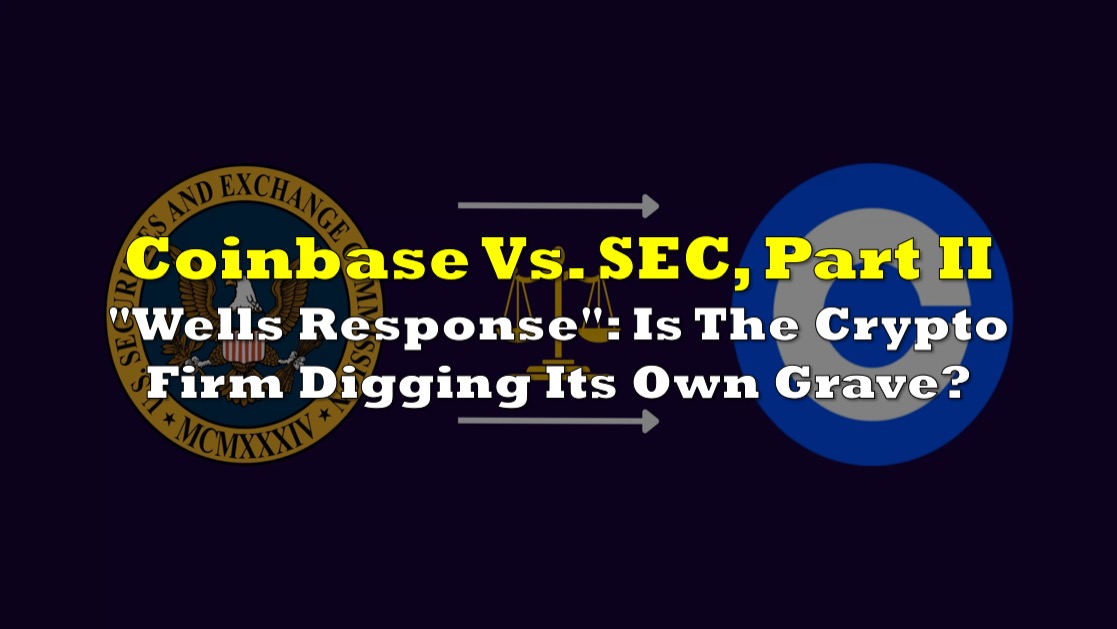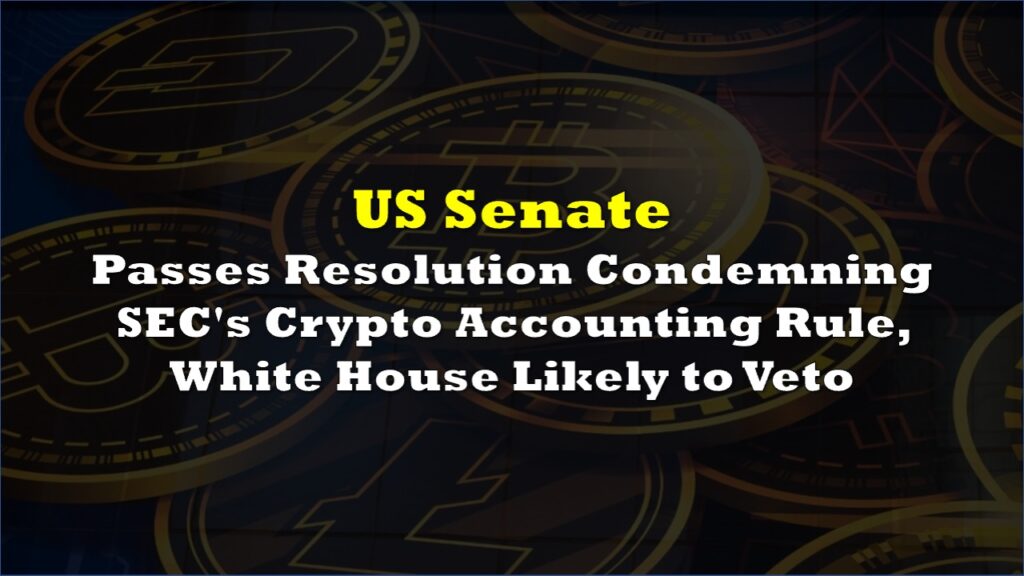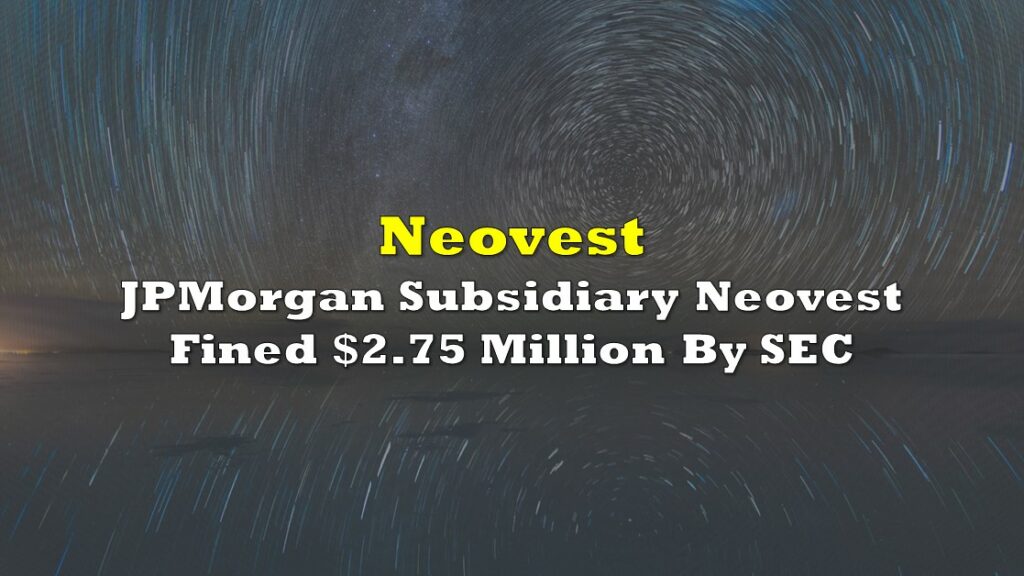Coinbase Global (NASDAQ: COIN) announced Thursday that it has responded to the Securities and Exchange Commission’s (SEC) Wells Notice, encouraging the agency not to pursue enforcement action against the business for the sake of the SEC.
In its Wells submission in response to SEC’s issuance of its infamous Wells notice, Coinbase warned that “if the Commission pursues this matter, it will face a well-resourced adversary that will necessarily be motivated to exhaust all avenues.”
“Coinbase has never wanted to litigate with the Commission. The Commission should not want to litigate either. Litigation will put the Commission’s own actions on trial, erode public trust cultivated over decades, undermine incentives for market participants to engage with the Commission in good faith, and present significant risks to broad aspects of the Commission’s enforcement program,” the crypto exchange said.
I guarantee you Gensler is now putting all the top SEC attorneys on this case
— Edwin Dorsey (@StockJabber) April 27, 2023
The more public $COIN makes this, the more painful it will be https://t.co/o2rjXnGiP0
This comes days after Coinbase filed a lawsuit against the regulatory agency, asking a US federal judge to order the SEC to reply to its earlier regulation petition within seven days in a narrow action.
In July last year, Coinbase requested that the SEC propose and adopt guidelines to define which digital assets are securities and how securities laws would apply to digital assets.
“Coinbase does not ask the Court to instruct the agency how to respond. It simply requests that the Court order the SEC to respond at all,” Coinbase said in its recent federal court filing.
The SEC released its framework for how digital assets fit within investment contract and securities laws in 2019, but the US crypto sector as a whole found it unsatisfactory.
With the exception of bitcoin, SEC Chair Gary Gensler has repeatedly stated that the majority of the 10,000 tokens in the crypto market are securities.
While Coinbase is taking the SEC to both legal and public court, both CEO Brian Armstrong and Chief Legal Officer Paul Grewal have sold portions of their holdings in the crypto exchange in the past two months.
This.
— Bitfinex’ed 🔥🐧 Κασσάνδρα 🏺 (@Bitfinexed) April 28, 2023
This is fucking ridiculous. "Shields up", while we're dumping our stock like it's Enron in April 2001. pic.twitter.com/fFPO86grZd
Coinbase is going to go full willybot market manipulation and fraud when they get sued by the SEC, just like Bitfinex/Tether did when NYAG filed the legal action against them. They’ll need to bring in money into the Ponzi to fund the fight.
— Bitfinex’ed 🔥🐧 Κασσάνδρα 🏺 (@Bitfinexed) April 27, 2023
There’s no other way, but fraud.
What is a crypto security?
The whole public tussle between Coinbase and the SEC is primarily rooted on differentiating digital assets from what can be considered securities within the decentralized finance space.
This kerfuffle heightened in July 2022 when the regulatory body was reportedly looking into the firm on whether the assets listed on its exchange are actually securities and therefore, should be under the purview of the SEC.
The move correlates with then recent indictment handed down on former Coinbase product manager Ishan Wahi, his brother, and his associate on an insider trading scheme as a result of a Justice Department investigation. The law enforcement agency found out that Wahi tipped his companions of upcoming listings on the exchange so they can hedge their bets ahead of the move.
While the firm appreciates Justice Department’s help in going after the three individuals, it it contending the SEC’s classification of the nine crypto tokens as securities.
“We understand that the SEC has separately filed securities fraud charges related to this wrongdoing today. The DOJ did not charge securities fraud. No assets listed on our platform are securities, and the SEC charges are an unfortunate distraction from today’s appropriate law enforcement action,” the company said on its website.
In response to the July civil suit, Coinbase said it filed a petition with the SEC to clarify the rule book on crypto securities, as it claims that it is the regulatory body’s job to delineate it from crypto assets.
“Crypto assets that are securities need an updated rulebook to help guide safe and efficient practices. Crypto assets that are not securities need the certainty of being outside those rules,” the company added. The firm, however, sees the fraud charges filed by the SEC suggest that it “has little interest in this most fundamental role of regulators.”
SEC says security
“The Chairman of the SEC, Gary Gensler, believes that digital currencies should legally be considered investment contracts and should therefore be considered registered securities. Coinbase, on the other hand, thinks a cryptocurrency is a commodity like gold, and therefore falls outside of the regulatory body’s authority,” wrote The Deep Dive contributor Jim McFadden.
On the SEC’s part, the discussion is not about labels, “but rather the economic realities of an offering.”
“In this [Coinbase fraud] case, those realities affirm that a number of the crypto assets at issue were securities, and, as alleged, the defendants engaged in typical insider trading ahead of their listing on Coinbase,” Gurbir S. Grewal, Director of the SEC’s Division of Enforcement.
In a nutshell, the assets can be considered securities as they behave that way, supported by the fact that insider trading happened within the exchange.
The regulatory body applies a 1946 US Supreme Court decision–more commonly known as the Howey test–to determine the legal identity of a digital asset as a security: if it involves investments financing a company’s operations with the intention of earning from the yield’s of the company’s profitable efforts.
“As today’s case demonstrates, whether in equities, options, crypto assets, or other securities, we will vindicate our mission by identifying and combatting insider trading in securities wherever we see it,” Carolyn M. Welshhans, Acting Chief of the Enforcement Division’s Crypto Assets and Cyber Unit then said in July.
Earlier this year in February, Coinbase revealed that it is under investigation by the Securities and Exchange Commission. The company has reportedly received “investigative subpoenas and requests” from the securities regulator.
The investigation, according to the end of 10-K filing made by the firm then, is reportedly related to a range of the services that Coinbase currently offers to clients, including “certain customer programs, operations, and existing and intended future products.” More specifically, the investigation includes the firms “processes for listing assets, the classification of certain listed assets, its staking programs, and its stablecoin and yield-generating products.”
This comes after another crypto firm, Kraken, agreed to shut down its staking-as-a-service offering for failing to register the offer and sale of the crypto assets with the regulator. Staking is a procedure in which investors “stake” or lock up their crypto tokens with a blockchain validator so they can validate data blocks for new tokens. The blockchain validators then share the yield of new tokens with the investors.
The decision to shut down staking operations, which the commission views as a security, was conducted as a means of resolving the investigation. As part of the settlement, Kraken also agreed to pay $30 million in disgorgement, prejudgment interest, and civil penalties.
At the same time, Armstrong was arguing publicly that “staking is not a security,” adding that it “brings many positive improvements to the space, including scalability, increased security, and reduced carbon footprints.”
Come March this year, Coinbase then revealed that it has received a Wells notice from the regulatory body.
Coinbase says not a security
In a video format of its Wells response featuring Armstrong and Grewal, the crypto exchange doubled down in asserting that “Coinbase does not list securities.”
“We use a robust process on SEC guidance to make sure that we don’t list securities,” Grewal said. “We reject some 90% of the assets that we review.
Coinbase has long made its case that the SEC should further define the characterization of each asset and install a clearer guideline on how these should be regulated, arguing that the legal precedents the regulatory body is basing its decisions on is relatively outdated. The firm believes that the current securities rules “do not work for digitally native instruments.”
Coinbase now: “We didn’t see this coming!!!”
— DIRTY BUBBLE MEDIA: 4 FUD'S SAKE (@MikeBurgersburg) April 28, 2023
Coinbase in their S-1: “We are subject to laws governing SECURITIES, BROKER-DEALERS and ATS (alternative trading services)…”
Good luck. $COIN pic.twitter.com/iRZgUNwPVh
“They don’t work for tokenized debt. They don’t work for tokenized equity. They don’t work for crypto. And that’s a major problem,” wrote Coinbase Chief Policy Officer Faryar Shirzad back in July after SEC’s civil suit.
In a blog post on its website published after the firm received the Wells notice, the company said, “We asked the SEC for reasonable crypto rules for Americans. We got legal threats instead.”
“We developed and proposed two different registration models. We spent millions of dollars on legal support to build these proposals and repeatedly asked for the SEC’s feedback. We got none. We also reiterated that we stand by our listings process – we don’t list securities today – and repeatedly invited the SEC to raise any questions about any asset at all on our platform. They raised none,” they wrote.
The company reportedly met with the regulator over thirty times in a period of nine months, with the SEC promising to provide feedback in January 2023. Instead, the agency instead is said to have returned to an enforcement investigation against the firm.
The Wells notice itself is said to be related to the firms listed digital assets, as well as its staking service known as Coinbase Earn, Coinbase Prime, and its Wallet product. The notice itself does not mean that the company has been charged with wrongdoing just yet, but that staff at the agency have recommended enforcement action for possible violations of securities law.
Coinbase said in its recent narrow action against the SEC that the commission’s lack of codified decision-making has caused uncertainty for crypto companies and prevented them from fully preparing for the future.
“It is widely recognized – including by a sitting SEC Commissioner – that existing SEC registration and disclosure requirements are incompatible with digital assets, which differ fundamentally from the stocks, bonds, and investment contracts for which the securities laws were designed and that the SEC traditionally has regulated. The SEC at a minimum must set forth how those inapt and inapposite requirements are to be adapted to digital assets. But the SEC has refused to do even that,” the filing said.
Coinbase says it’s the SEC
But, Coinbase did not stop there. A major part of its Wells response has been dedicated in turning the table around and castigated SEC’s approach “of determining on the fly what the law requires.”
CEO of $COIN makes a compelling short case for his company https://t.co/nlfN3wUltm
— Edwin Dorsey (@StockJabber) April 27, 2023
First, Coinbase cited how it was allowed to be publicly listed in the Nasdaq Stock Exchange in April 2021, which the firm said came after “months and months of review by the SEC.”
“The SEC asked a lot of questions about our business and our services, which looks very much like the business we have today,” Grewal said in the video response to SEC’s Wells notice, adding that those services included asset listing, staking, and the Coinbase Wallet–which are presumably the services SEC is characterizing as securities.
Grewal cited Gensler’s testimony in a Congressional hearing back in May 2021 when he said “I do think that working with Congress, and I think it is only Congress that could really address it, . . . because right now the exchanges trading in these crypto assets do not have a regulatory framework either at the SEC, or our sister agency, the [CFTC] . . . . Right now, there is not a market regulator around these crypto exchanges.”
But Grewal contrasted this to Gensler’s pronouncements four months ago, following the collapse of crypto exchange FTX, saying “I feel we have enough authority, I really do, in this space.”
“In the time between this statement and the prior ones, Congress did not pass any new legislation to fill the statutory void… and the SEC has not tried to fill the void itself,” Grewal explained.
Further, Coinbase argued in its Wells response that the SEC should not push through with litigating the crypto firm. It enumerated a number of reasons, including that “litigation on this record will put the commission’s own practices on trial,” a legal battle would put the Howey Test on trial for digital assets which could entail ramifications for the whole investing space in general, and “a ruling from a court on these issues could curtail the Commission’s ability to address many other novel products or markets without express legislative authority.”
Grewal also cited that the Commodity Futures Trading Commission (CFTC) has recently formally identified bitcoin, ethereum, litecoin, and USDC and other stablecoins as commodities. He also said that it holds a license from the New York Department of Financial Services, which requires the firm to not list securities.
“The Commission could return to Congress to seek the authority it wants over the crypto industry. In the meantime, it could respond to Coinbase’s pending petition for rulemaking or initiate its own—giving the industry a fair opportunity to provide input and expertise. And, if the Commission believes that particular digital assets are securities, or certain parts of Coinbase’s business should be registered in particular ways, Coinbase continues to welcome that dialogue,” the firm said in its Wells response.
Arguably, however, given the recent examples made out of SEC’s intensifying crypto crackdown, observers see that this Wells response doesn’t bode well for Coinbase’s prospects. The heart of the matter will still go back to defining/disproving the crypto firm’s services as securities, despite public pronouncements of either sides.
.@coinbase wrote a blog post disclosing it's Wells submission written by its lawyers to @SECGov & predictably said the #SEC was wrong & it was right; MSM nonetheless reported that as news! It is not, as @BetterMarkets points out here: https://t.co/ulkBR09lJ1
— Dennis Kelleher (@DennisKelleher) April 27, 2023
This comes on the heels of Coinbase securing a license to operate in Bermuda, indicating that the company is doubling down on plans to expand its foreign operations at a time when US regulators have proven unfriendly to the crypto industry.
“I think the U.S. has the potential to be an important market for crypto, but right now we are not seeing that regulatory clarity that we need,” Armstrong said at the recent Fintech Week in London. “I think in a number of years if we don’t see that regulatory clarity emerge in the U.S. we may have to consider investing more elsewhere in the world.”
Information for this briefing was found via the sources mentioned. The author has no securities or affiliations related to this organization. Not a recommendation to buy or sell. Always do additional research and consult a professional before purchasing a security. The author holds no licenses.










One Response
The SEC & the Chair Gary Gensler have become much more anti-crypto recently. Each time SEC has taken an action or Gensler made a decision, this would somehow benefit the Wall Street (or SBF & FTX Alameda in past). In general, the establishment Wall Street finance & banking system has always viewed cryptocurrencies and the blockchain tech as the potential foe and threat. Therefore, this finance lobby power had indirectly (with the help of political lobbyists and favorable Fed bureaucrats) blocked or slowed crypto regulatory & legal processes/procedures. That’s why the US crypto market has to operate under legal uncertainty where each US Federal agency treats them differently in terms of how this agency legally views cryptocurrencies – some treating crypto as assets, others as securities or a property.
The EU is far ahead of the US with the MICA Act. That’s why the US has to move swiftly and adopt much cleaner & well-defined set of rules and regulations, overall regulatory framework. And this is an absolute must for the crypto mass adoption, blockchain tech’s more rapid growth & development.
And those on the Wall Street who saw significant potential in the crypto & blockchain have become major actors, investors and crypto asset holders. This is exactly what had fueled the past bull run, the entrance of the smaller scale and individual organizational money & funds.
Hopefully more crypto-knowledgeable and crypto friendly politicians lead this policy debate and legal & regulatory changes.
Gensler did an extremely good job in not answering any questions during the grilling and that’s precisely what he was there at the hearing for: Not to answer any questions! I don’t think the crypto & blockchain community of USA will see any significant policy shifts very soon.